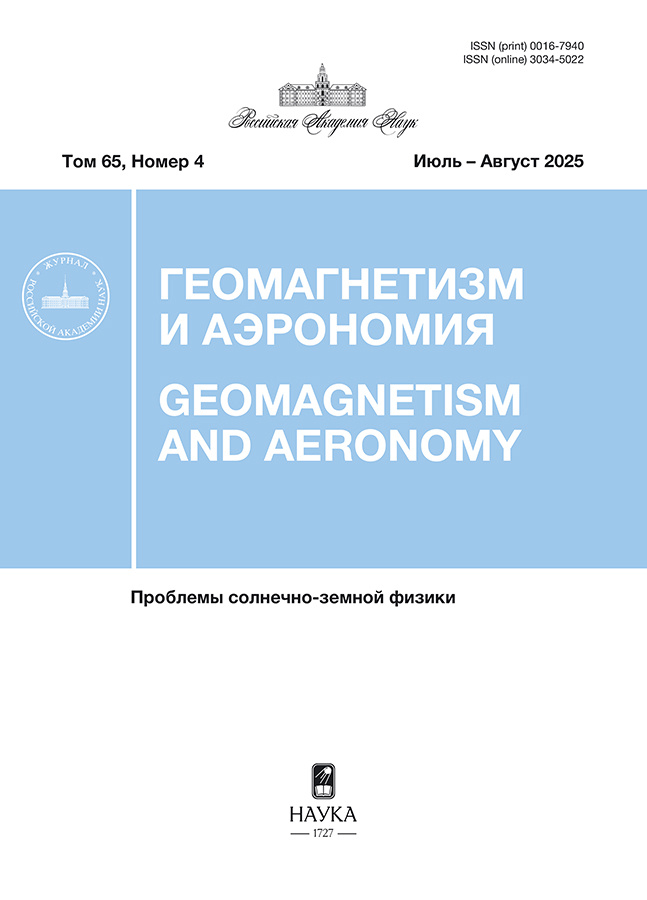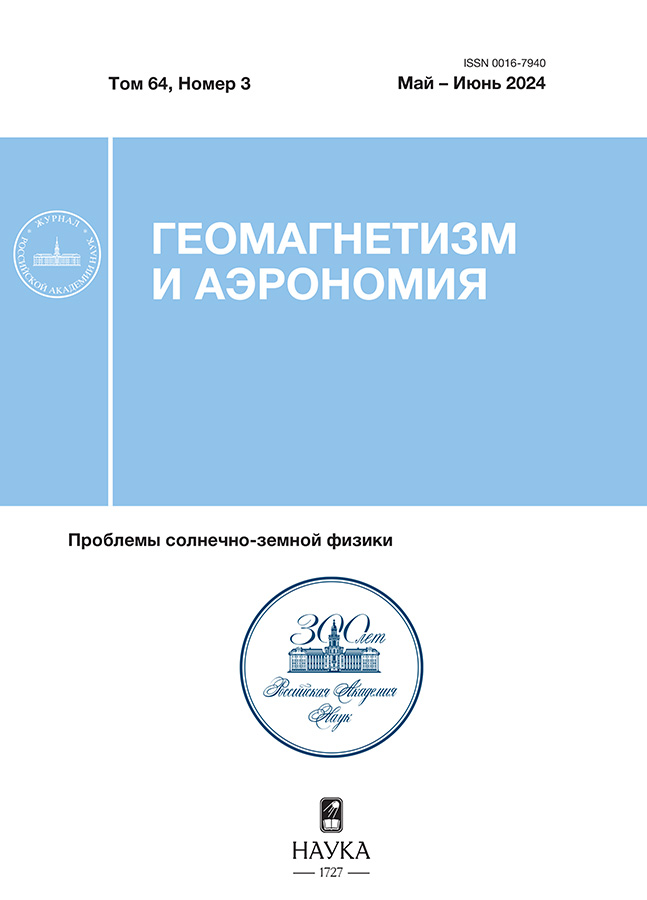Seasonal-diurnal features of the medium-scale traveling ionospheric disturbances characteristics in the Asian Region of Russia During years of moderate solar activity
- Authors: Kurkin V.I.1,2, Podlesnyi A.V.1, Cedrik M.V.1, Sofyin A.V.1,2
-
Affiliations:
- Institute of Solar-Terrestrial Physics of Siberian Branch of Russian Academy of Sciences
- Russian New University
- Issue: Vol 64, No 3 (2024)
- Pages: 400-407
- Section: Articles
- URL: https://ruspoj.com/0016-7940/article/view/650931
- DOI: https://doi.org/10.31857/S0016794024030065
- EDN: https://elibrary.ru/SMRMAS
- ID: 650931
Cite item
Abstract
Based on data from a network of oblique-incidence sounding radio paths at mid-latitudes in the Asian region of Russia, a high (up to 40−50%) average-daily recording probability of the medium-scale traveling ionospheric disturbances in years of moderate solar activity has been identified. The daily variation in the recording probability of these disturbances at mid-latitude radio paths in the Asian region of Russia has a pronounced seasonal dependence. For the winter season, there is a daily maximum probability, reaching 100% on some days. In the summer season, it occurs at night hours of local time at the midpoint of the corresponding radio path. The most likely reason for this is the transition from winter to summer pattern of the atmosphere zonal circulation.
Full Text
About the authors
V. I. Kurkin
Institute of Solar-Terrestrial Physics of Siberian Branch of Russian Academy of Sciences; Russian New University
Author for correspondence.
Email: vikurkin@yandex.ru
Russian Federation, Irkutsk, Moscow
A. V. Podlesnyi
Institute of Solar-Terrestrial Physics of Siberian Branch of Russian Academy of Sciences
Email: pav1986@rambler.ru
Russian Federation, Irkutsk
M. V. Cedrik
Institute of Solar-Terrestrial Physics of Siberian Branch of Russian Academy of Sciences
Email: mark7cedrick@gmail.com
Russian Federation, Irkutsk
A. V. Sofyin
Institute of Solar-Terrestrial Physics of Siberian Branch of Russian Academy of Sciences; Russian New University
Email: sof@rambler.ru
Russian Federation, Irkutsk; Moscow
References
- Вертоградов Г.Г., Денисенко П.Ф., Вертоградова Е.Г., Урядов В.П. Мониторинг среднемасштабных перемещающихся ионосферных возмущений по результатам наклонного ЛЧМ-зондирования ионосферы // Электромагнитные волны и электронные системы. Т. 13. № 5. С. 35–44. 2008.
- Подлесный А.В., Брынько И.Г., Куркин В.И., Березовский В.А., Киселев А.М., Петухов Е.В. Многофункциональный ЛЧМ ионозонд для мониторинга ионосферы // Гелиогеофизические исследования. Вып. 4. С. 24–31. 2013.
- Софьин А.В., Куркин В.И. Исследование пространственных областей влияния ПИВ на ионограммы наклонного зондирования ионосферы // Труды XXVII Всероссийской открытой научной конференции “Распространение радиоволн” [Электронный ресурс]: научное электронное издание. Калининград: Издательство БФУ им. И. Канта. С. 358–363. 2021.
- Heitmann A.J., Cervera M.A., Gardiner-Garden R.S., Holdsworth D.A., MacKinnon A.D., Reid I.M., Ward B.D. Observations and modelling of travelling ionospheric disturbance signatures from an Australian network of oblique angle-of-arrival sounders // Radio Sci. V. 53. № 9. P. 1089–1107. 2018. https://doi.org/10.1029/2018RS006613
- Kurkin V.I., Medvedeva I.V., Podlesnyi A.V. Effect of sudden stratosphere warming on characteristics of medium-scale traveling ionospheric disturbances in the Asian region of Russia // Adv. Space Res. 2023. https://doi.org/10.1016/j.asr.2023.09.020
- Long C., Yu T., Sun Y.-Y., Yan X., Zhang J., Yang N., Wang J., Xia C., Liang Y., Ye H. Atmospheric gravity wave derived from the neutral wind with 5-minute resolution routinely retrieved by meteor radar at Mohe // Remote Sensing. V. 15. № 2. ID 296. 2023. https://doi.org/10.3390/rs15020296
- Medvedev A.V., Ratovsky K.G., Tolstikov M.V., Alsatkin S.S., Scherbakov A.A. Studying of the spatial-temporal structure of wavelike ionospheric disturbances on the base of Irkutsk incoherent scatter radar and Digisonde data // J. Atmos. Sol.-Terr. Phy. V. 105–106. P. 350–357. 2013. https://doi.org/10.1016/j.jastp.2013.09.001
- Munro G.H. Travelling disturbances in the ionosphere // P. Roy. Soc. Lond. A Mat. V. 202. № 1069. P. 208–223. 1950. https://doi.org/10.1098/rspa.1950.0095
- Verhulst T., Altadill D., Mielich J. et al. Vertical and oblique HF sounding with a network of synchronised ionosondes // Adv. Space Res. V. 60. № 8. P. 1644–1656. 2017. https://doi.org/10.1016/j.asr.2017.06.033
- Vybornov F., Sheiner O., Kolchev A., Zykov E., Chernov A., Shumaev V., Pershin A. On the results of a special experiment on the registration of traveling ionospheric disturbances by a system of synchronously operating chirp ionosondes // Atmosphere. V. 13. № 1. P. 84–98. 2022. https://doi.org/10.3390/atmos13010084
- Wells H.W., Watts J.M., George D.E. Detection of rapidly moving ionospheric clouds // Phys. Rev. V. 69. № 9–10. P. 540–541. 1946. https://doi.org/10.1103/PhysRev.69.540
- Zolesi B., Fontana G., Perrone L.et al. A new campaign for oblique incidence ionospheric sounding over Europe and its data application // J. Atmos. Sol.-Terr. Phy. V. 70. № 6. P. 854–869. 2008. https://doi.org/10.1016/j.jastp.2007.02.015
Supplementary files

















